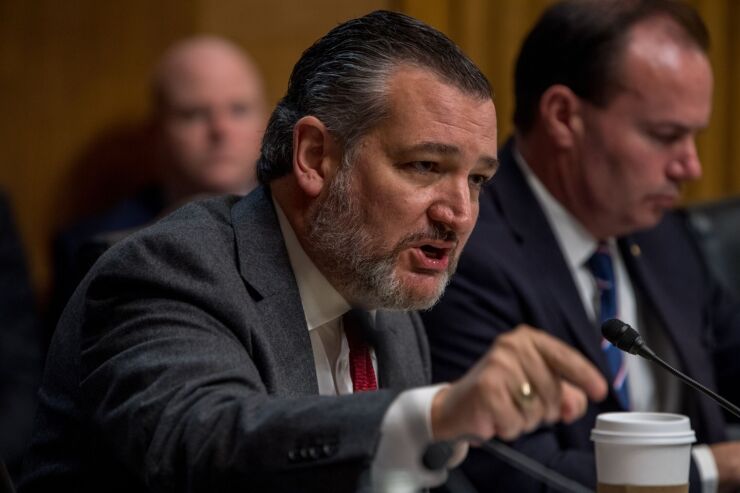Major transportation grants newly open to Congressional review under GAO ruling
3 min read

Texas Sen. Ted Cruz has said he will challenge more than $5.5 billion of federal transportation grants after the U.S. Government Accountability Office agreed with him that the grant criteria should be subject to Congressional approval.
The GAO on Oct. 18 issued an eight-page ruling that found that the U.S. Department of Transportation’s Multimodal discretionary grant funding opportunity, which covers three major discretionary grant programs, is actually a rule — more than just guidance — and therefore triggers the Congressional Review Act.
Cruz, who asked the GAO to review the NOFO in July, said he would file a Congressional Review Act resolution seeking to block the grant criteria.
Bloomberg
“I urge my colleagues to join me in blocking the Biden administration’s efforts to tie up federal funding with radical environmental and racial equity requirements,” Cruz said in a statement. “President Biden and Secretary Buttigieg should allocate grant funding by implementing the law as written instead of trying to direct taxpayer money to favored projects and constituencies.”
The Congressional Review Act, enacted in 1996, requires federal agencies to submit a report on each new rule to both Houses of Congress and to the Comptroller General for review before it can take effect. Congress can review and disapprove rules issued by federal agencies for a period of 60 days.
If a resolution of disapproval is enacted, then the new rule has no force or effect.
The dispute highlights the ongoing partisan debate in Congress over the role that environmental, social and governance factors should play in federal funding, including for infrastructure. The GAO’s determination echoes an earlier controversy over a Federal Highway Administration memo that Republicans — and many states — said unfairly dictated how states should spend their federal highway dollars.
Published in June by the DOT, the Multimodal NOFO provides $5.57 billion of funding in fiscal years 2023 and 2024 for three popular surface transportation grant programs: the Nationally Significant Multimodal Freight and Highway Projects program, or Infra; the National Infrastructure Project Assistance Program, or Mega; and the Rural Surface Transportation Grant Program, or Rural.
Unlike the dozens of other new grant programs created under the IIJA, the U.S. Department of Transportation combined the application for the three programs to help streamline the effort for applicants.
Cruz targeted NOFO language that says eligible projects will need to “sufficiently consider” — per the DOT’s determination — factors such as “equity and barriers to opportunity” and “climate change and environmental justice” in order to win federal support.
“These items would not have passed in Congress,” Cruz said. “The additions change the kinds of projects that can access federal funding and make the grant process unnecessarily complicated and costly.”
The Multimodal program was created as part of the 2021 Infrastructure Investment and Jobs Act, which allocated a total of up to $15 billion from 2022 through 2026 for all three programs.
The most recent application period closed on Aug. 21, and the DOT was expected to announce awards as soon as early 2024. Last year, the DOT awarded nearly $1.2 billion from the Mega Program for nine projects, including the New York-New Jersey Gateway program and the Ohio-Kentucky Brent Spence Bridge, and $1.5 billion for 26 projects through the Infra program and $274 million for 12 projects through the Rural program.
The DOT did not immediately respond to a request for comment.







